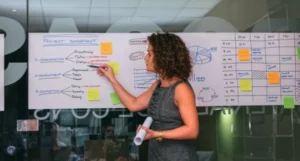What is task management and the best way to manage team tasks

Table of contents
Taking on projects and seeing them through to completion is an essential routine for any organisation. Completing tasks efficiently, orderly, and on time necessitates careful project management.
A project is made up of numerous tasks and activities carried out by various individuals and teams, all of which contribute to the project’s successful completion. So, the key to effective project management is managing the tasks better, monitoring their progress, and organising and optimising them in a systematic manner. Such an activity necessitates more than a simple to-do list and a schedule; task management becomes an important component of project management at this point.

What is task management?
Task management is the process of tracking, managing, and executing the life cycle of a task or a set of tasks within a project, from inception to completion. The goal of task management is to improve a task’s or project’s decision-making, communication, efficiency, and effectiveness.
Task management is something that most adults do on a daily basis. Consider the task of running a household. Whether you are single or have a family, you must manage your time and energy throughout the day to complete tasks such as attending work meetings, cleaning, grocery shopping, and more.
Task management on a project team necessitates organizational abilities and strategic thinking. You must also be familiar with apps and software, as well as manual methods such as task lists and charts.

Source- https://www.zoomshift.com/blog/time-management-statistics/
Task management VS Project management
The primary distinction between task management and project management is the scope of work required. Project management is used to manage large-scale projects, whereas task management is used to manage small-scale tasks.
Task management can be thought of as a to-do list, whereas project management ensures team member functionality and keeps track of all the moving parts of a project to ensure successful completion.
1. Size and Scope of Your Objective
The primary distinction between task and project management is that project management is used to oversee the achievement of a larger goal. Task management can be used to organize and complete the tasks necessary to achieve and deliver the goal.
If you are building a house, for example, you would use project management to guide your process. Construction is made up of many different tasks, such as pouring a foundation, framing, finishing, and so on.
All tasks must be completed in order for the entire project of building a house to come together. During the project planning phase, each individual task in the project will be meticulously planned.
If you were simply replacing a tread on a deck, task management would be more appropriate. It only takes one or two tasks to complete the objective, and it is unrelated to a larger goal.

Source- https://99firms.com/blog/time-management-statistics/#gref
2. Everything is in the Details
To ensure the successful completion of individual tasks within a project, task management necessitates a detailed workflow, whereas project management necessitates a more holistic approach to managing the entire project from start to finish.
Tasks may be interdependent, and time may be of the essence. When framing a house, the framers cannot begin without a foundation to work from.
Task management can ensure that tasks are completed on time by using time tracking and workflow management, which also highlights the order in which they must be completed so that other tasks can build off of this work, and time tracking can also assist you with project budgeting.
3. Project management is a one-time event, whereas task management is ongoing
Smaller projects or tasks that employees complete on a daily basis are managed using task management. Workers must complete tasks on a consistent basis, whether it is sending out daily reports or attending meetings. Task management tools can be used to create recurring tasks and task dependencies for daily use, thereby streamlining your workflows.
Project management is a temporary position. When a company needs to take on larger projects, such as developing new software or creating a new product or app, it uses this method.
You can use project management tools to define initiatives and timeframes, prioritise milestones and tasks for your project team, help determine the project’s life cycle, measure project progress, and use automation and integrations to keep the project on track and within budget.
These two use cases have distinct goals and requirements. It is critical to understand which management process will work best for your use case.
Also Read: Everything You Need to Know About Project Management
Task management software
With the best task management software solutions, you can unleash the full potential of your team.
Hive
Hive is a comprehensive productivity software that enables teams to work more efficiently. Hive can be used by teams of any size as a task management tool to manage upcoming tasks, assign work to team members, and collaborate within the platform. Hive is loved by thousands of teams for its project management capabilities, remote work tools, and powerful team collaboration solutions, in addition to being a great task management software.
Hive has the following features:
- Kanban, Gantt, Portfolio, Calendar, Table, Summary, and other flexible project layouts are available.
- Tasks can be created and assigned using meeting notes.
- Emails can be used to create and assign tasks.
- Tasks should be assigned to both internal and external users.
- Timekeeping and resource allocation
- Files can be uploaded, organised, and attached to tasks.
- Using templates, create repeatable tasks.
- Use comments and tags to communicate about tasks.
MeisterTask
MeisterTask is task management software designed for agile teams, but it can also accommodate teams with a variety of workflows. This software has been designed with streamlined features that are intended to be intuitive and user friendly. Teams in the platform use customizable Kanban-style boards to organise tasks and track project progress. One of the most appealing features is MeisterTask’s free basic plan, which provides limited functionality (for an unlimited number of project members) for no charge.
MeisterTask has the following features:
- Varying levels of responsibility with task “assignees” and “watchers”.
- Time-tracking functionality is built in.
- Custom fields can be added to tasks.
- Several checklists within tasks.
- Files and images should be attached to tasks.
- Tags and task relationships.
Casual
Casual is a visual task management tool that allows you to organise your tasks in the way that works best for you. Casual is ideal for all types of project-based teams, not just project managers. Casual differs in that it does not display tasks in traditional project layout views, instead allowing users to organise tasks as they see them in their minds. Casual even has pre-set templates to help you get started if you’ve never worked with visual project management before.
Casual has the following characteristics:
- Creating a visual workflow.
- Charting.
- Task interdependence and grouping.
- Task assignment and deadline setting.
- Tasks and projects that can be repeated.
- Monitoring of milestones.
nTask
nTask is a task management and project management tool that helps with project development, team collaboration, and risk assessment. The application’s interface is simple and straightforward, making it simple to onboard new users. nTask is also simple to use because it is available on multiple platforms.
nTask has the following features:
- Task administration
- Risk administration
- Project administration
- Team leadership
- Gantt graphs
- Boards for Kanban
Best way to manage team tasks
Assume you have a major goal in mind or require assistance in completing the hundreds of tasks on your company’s to-do list. In either case, knowing how to lead your team towards your goals can make your workdays much more manageable. The list below includes several suggestions for effectively managing your team’s tasks and charting an easy path to your goal.
1. Make specific objectives
Determine your team’s main goal and create a task list for your team to complete. Make your list specific, including only tasks that directly contribute to your goal.
2. Create timelines and deadlines
Determine how long each task will take to complete. To keep your team on track, assign deadlines to each task. To make it easier to track progress, organize your task list by deadline.
3. Establish priorities
Which tasks are required to begin the project? Which tasks will necessitate the most effort? Answer these questions to determine the priority of each task. Tasks with the earliest deadlines and highest priority should be prioritised.
4. Understand what you require
Make a list of the tools, resources, research, and information needed for each task. Consider any potential roadblocks that may arise during each of these processes, and devise backup plans to address those concerns.
Conclusion
Task management entails organizing and coordinating various tasks in order to efficiently achieve specific goals. A structured approach is essential for effectively managing team tasks. The best way to accomplish this is to use a combination of tools, clear communication, and prioritisation. Begin by defining your goals, then breaking them down into smaller tasks and assigning responsibilities. Track progress, set deadlines, and allocate resources using task management software. Effective communication is essential for keeping team members on the same page and informed. Collaboration is aided by regular check-ins and feedback loops. Sort tasks according to their importance and urgency. By combining these strategies, teams can streamline their workflow, increase productivity, and effectively achieve their goals. Unlock efficiency with ProHance to transform your workforce management today!
Frequently Asked Questions
Q1. What are some potential team task management challenges, and how can they be overcome?
Miscommunication, task overlap, and shifting priorities are all potential challenges. Clear communication channels, regular team meetings, and adaptable project management tools can help to address these issues.
Q2. What is the role of time management in task management?
Task management relies heavily on time management. It entails allocating time to tasks, setting deadlines, and ensuring efficient resource use to complete tasks on time.
Q3.How does task management fit into larger project management processes?
Project management includes task management. It entails breaking down project goals into smaller tasks, assigning responsibilities, setting timelines, and tracking progress, all of which contribute to a project’s overall success.



